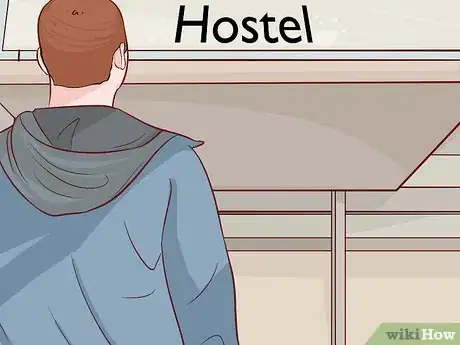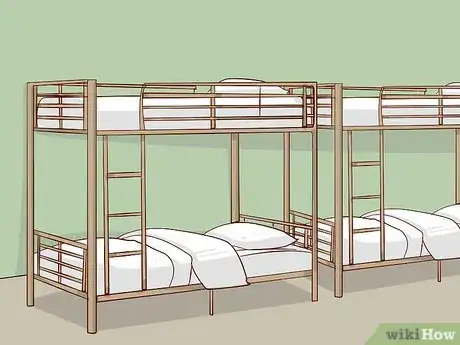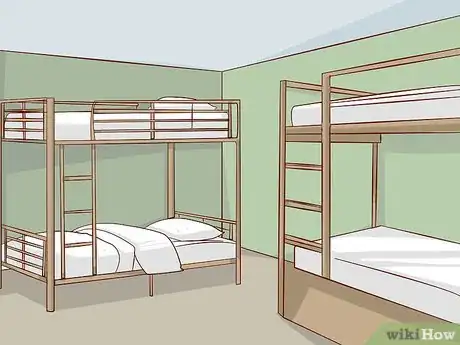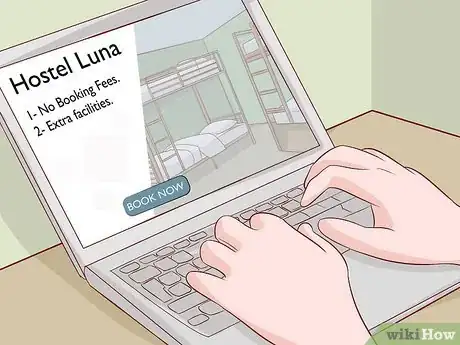This article was co-authored by wikiHow Staff. Our trained team of editors and researchers validate articles for accuracy and comprehensiveness. wikiHow's Content Management Team carefully monitors the work from our editorial staff to ensure that each article is backed by trusted research and meets our high quality standards.
wikiHow marks an article as reader-approved once it receives enough positive feedback. This article received 14 testimonials and 95% of readers who voted found it helpful, earning it our reader-approved status.
This article has been viewed 167,018 times.
Learn more...
Hostels are inexpensive hotels or inns that generally cater to budget travelers. Often located in major cities or around tourist sites, they feature basic accommodations and cheap rates. Setting up your own hostel takes a lot of planning and thought. First, find the ideal location and check all local zoning laws. Then, find the perfect building and equip it with beds and other accommodations for guests. To attract business, network and advertise your hostel to make it a new tourist destination.
Steps
Finding the Right Location
-
1Pick a location that attracts budget travelers. Most people who stay in hostels are looking for a good deal on housing while they travel. Start by thinking about good locations that travelers frequent. Big cities with a lot of tourism are good starting points. Beach locations are also popular for travelers.[1]
- If you’re local to the area you want to open your hostel in, then think about the places people always visit when they travel to your area. If you’re relocating to a new area, ask locals or check online for popular local destinations. Get an idea of what people are looking for when they visit this area.
- Hostels can also work in rural areas if there is a local attraction nearby. For example, popular hiking trails can attract plenty of business to a rural location. As an added bonus, real estate is probably cheaper in these areas.
-
2Find a building near reliable local transportation. Most people who stay at hostels aren’t bringing cars, so reliable transport is important. People won’t be able to reach your hostel if it isn’t near transportation, and they also won’t be able to explore the local area. Find a location near local trains and buses to make your hostel more attractive for travelers.[2]
- A location within walking distance of local attractions like historic sites and restaurants is even better.
- If there isn’t good local transit nearby, try to offer other transportation options. Partner up with local cab companies, for example, or consider renting bikes to help your guests get around.
Advertisement -
3Research local competition. You may not be the first hostel in the area, and these other hostel owners are your competition. Investigate what these hostels offer their guests and how they operate. You could even book a stay at some of these hostels to really see what the guest experience is like. Then use what you learn to run your own hostel.[3]
- If an area is particularly saturated with hostels, then consider a different area. There may be too much competition here for you to get ahead.
- While you should pay attention to your competition, don’t feel like you have to copy them. This is your hostel, and if you have a unique idea that no one else is doing, then put it into action.
Getting Permits and Financing
-
1Check local zoning laws to see where hostels are permitted. When you think you’ve found the right area for your hostel, check local laws before you do anything else. Some towns and cities have designated zones for hostels, and running one outside these areas is illegal. Find out where hostels are allowed, then search for a suitable building within these areas.[4]
- Many local governments have their zoning laws on the internet. Try searching the local government website for hostel information.
- Contact the local zoning agency and ask about which areas are zoned for hostels.
-
2Apply for any necessary permits to run a hostel. Most cities require permits and licenses to run a hostel. Check with your local zoning board or chamber of commerce and ask what regulations there are for operating a hostel. Apply for and obtain all the permits before opening your hostel.[5]
- Remember that permits often take time to process and cost a fee. Include the potential processing time and fees in your calculations on when the hostel will open.
- Don't try to save time or money by skipping certain permits. If you operate a hostel without all the necessary permits, you could be fined or even arrested.
-
3Add up your expected operating costs. Operating costs are what it costs to keep a business running every day. Account for every dollar you will spend in opening this hostel so you know how much financing to secure. Calculate the rent, utilities, and any other expenses so you have a full picture of your business finances.[6]
- Remember to include taxes in your estimation of costs.
- Include the outlay for construction, permits, and hiring employees as well. This gives you your total cost for the project.
-
4Secure financing for the hostel. Have at least 1 year of expenses on hand before opening the hostel to support the business before you start profiting. If you don’t have enough savings to self-finance opening and operating the hostel, then you’ll need funding from other sources. Consider going to a bank for a business loan. Another option is finding affluent people interested in providing private investment for the hostel. Whichever option you choose, have financing in place before you start building your hostel.[7]
- There are advantages and disadvantages to looking for loans from banks or individuals. Banks may be more conservative and refuse to loan you more than a fixed amount. Private investors may be more willing to offer higher sums, but they want a return on their investment. They might want to own a part of the business and share in the profits. Consider the costs carefully before choosing a financing option.
- Produce a good business plan, especially if you’re looking for private financing. Investors will want a return on their investment, and if you don’t prove that your business will be profitable, they won’t provide financing.
Planning the Space
-
1Find a building that doesn’t need a lot of construction to save costs. When you find a good location and start searching for a hostel building, prioritize buildings that don’t need a lot of construction. Building modifications are not only expensive, but they usually require additional permits as well. You’ll save time and money by finding a building in good condition. Keep a few points in mind when looking for a building.[8]
- Make sure there is an internal space large enough for a guest common area.
- Find a building with several bathrooms, or spaces that you can convert into bathrooms.
- Any building you consider should be safe and structurally sound.
- Consider if you want to rent or buy the building. Buying gives you an equity-building real estate property, but it also comes along with other taxes and responsibilities. Renting doesn't have those associated risks, but you also will owe rent for the entire time you operate the hostel.
-
2Set up bedrooms that fit 4-12 people. Hostels don’t offer private rooms, so guests staying together is expected. Survey the building and see how many beds you can fit in each bedroom. This depends on the available space. Less than 4 people in a room would be wasting valuable space, but more than 10 or 12 would get too crowded. Find the right balance for your building.[9]
- Use bunk beds to maximize bed space in the living areas.
- Do not overcrowd rooms. This is a potential safety violation. Being piled in with too many people also infringes on the guest experience.
- Also stock bedrooms with blankets, sheets, pillows, and pillowcases. Hostel visitors don't expect luxury, but you should provide this level of comfort for your patrons.
-
3Build at least 1 full bathroom for every 8 beds. Having enough facilities is important for establishing your hostel's reputation. Guests at hostels expect to share bathrooms, but don’t overcrowd them. When the hostel is full, 1 bathroom for 8 people is manageable without becoming a hardship.[10]
- Make sure all your bathrooms have a shower and toilet. Otherwise the bathrooms will get overcrowded
- Hostels usually don't stock towels or toiletries for their guests. Consider offering basic toiletries like toothpaste and soap for an extra fee.
- You could consider communal bathrooms if you don't have enough space for multiple individual ones.
-
4Organize a common area for guests to mingle. Guests at hostels often want a community experience, and a common area is important. Find a building that has a large enough space for couches and tables where your guests can meet and socialize.
- Put activities like board games and cards in the common room for guests to entertain themselves. Include some books for people who prefer to keep to themselves.
- Hostel owners usually don't like putting TVs in their common areas. This is not only an added expense, but it also ruins the atmosphere.
- If you can’t find a building with a large enough space already there, see if you can knock down some walls to open the space up. Remember to apply for any necessary permits for this type of construction.
-
5Provide laundry facilities for your guests. Travelers need to keep their clothes clean. Onsite laundry facilities will improve your guest experience considerably. Install a washer and dryer unit during the construction phase so your guests will have access as soon as you open.[11]
- If you don’t have laundry facilities onsite, consider partnering with a nearby laundromat. You can recommend your customers there in exchange for discounted laundry services.
-
6Offer lockers for guests to keep their belongings safe. Since many people come and go from hostels, crime and theft does occasionally happen. Let your guests know their belongings are safe by giving them lockers for their valuables. Provide either a key or combination lock so these lockers remain secure.
- Closely screen any employees or volunteers that have access to guest areas as well. If customers report that their belongings were stolen at your hostel, your business could fail from the bad feedback.
Maximizing Your Guests’ Experience
-
1Offer tours of the local area. Your guests want to get a feel for the local area. Consider offering complimentary tours of the area. If you have a large van, this is a great use for it. In smaller areas, a walking tour is a great amenity to offer.[12]
- If you won’t give the tours yourself, try networking with local bus drivers or tour companies. They can take your guests around in exchange for a discount.
- You can also leave brochures, maps, and posters by the front desk so your guests always know what’s going on and where to go.
-
2Host parties, barbeques, or other socializing events. These events are a great way to give your hostel a reputation as the place to visit. Provide plenty of opportunities for guests to meet each other and have fun. A weekly cookout on Friday or a monthly show from a local band all bring attention to your business. Get creative and show your guests a good time.[13]
- Don’t pressure guests into attending any of your events. Some guests prefer to be left alone and won’t like being pressured. Merely mention the event and invite everyone.
- Consider inviting other locals to the parties as well. If you sell food or charge admission to non-guests, you can create another revenue stream.
-
3Designate quiet areas for guests who want more privacy. Even sociable people need some quiet time. If you have enough room, set aside some space for a quiet area. Guests can come in here and work, relax, or just get away from other people.[14]
- Set rules that guests can’t use phones or play music without headphones in quiet areas. Set a relaxing atmosphere.
-
4Consider offering a bed in exchange for work around the hostel. There are numerous mundane tasks around the hostel like sweeping, stocking shelves, or picking up after guests. You can save money by offering a free stay for guests willing to do some of these tasks. That way, you avoid hiring people to do the work. This can also attract more customers who might be interested in the same deal.[15]
- Only do this when you need work done, though. If you don’t need any work done, you’re losing money by offering this deal.
Advertising Your Hostel
-
1Make a good website for your hostel. Everything happens online nowadays, so a hostel without an internet presence is nearly invisible for travelers. Build a professional website for your hostel. Include pictures, testimonials, services, attractions, and lists of local businesses. Make customers want to visit your hostel when they see your site. Update your website regularly so customers know the latest information about your business.[16]
- If you aren’t confident that you can design a website yourself, hire a professional. This isn’t an area that you should skimp on.
- Make sure guests can easily book their stay on your website. Otherwise they have to book through a different site and you’ll have to pay that site a commission.
- Don’t forget about social media either. Start pages and keep them updated regularly.
-
2Reach out to well-known travel bloggers to write about your hostel. There are travel bloggers on social media that have millions of followers, so a writeup from one of them can be huge for your business. Do an internet search and see who some influential bloggers are and how to reach out to them. Contact them and offer a free stay in exchange for a review.[17]
-
3Build relationships with other local business owners. Hostels are part of local communities, so become part of that community. Get to know the local business owners and recommend their services to your guests. Make a list of bars, tour guides, clubs, and tourist attractions and recommend them to your guests. These same business owners can point travelers towards your hostel. These mutually-beneficial relationships can help your hostel succeed.[18]
- Be prepared to offer something in return for local businesses recommending your hostel. Offer to carry their brochures in your lobby or put out a pamphlet of recommended local restaurants and bars.
-
4Network with other hostel owners. It might seem counterproductive to network with your competition. However, your competitors can be a big help for you. For example, if you’re friends with a hostel owner down the street and his hostel is full for the night, he can direct new visitors to your hostel instead. Take advantage of this network by meeting and making friends with as many hostel owners as you can.[19]
- Network with hostel owners outside your area too. Backpackers and other travelers usually jump from town to town. If one hostel owners hears that his guests are heading to your town, he can recommend your hostel.
- Remember to offer the same favors in return. Other hostel owners will catch on if you’re just using them for business and stop helping you.
Community Q&A
-
QuestionDo I need to own my own land to register a hostel?
 Community AnswerA rented building could also be registered as a hostel, but only when you're financially stable and can handle losses (as it will be a profit-loss thing then).
Community AnswerA rented building could also be registered as a hostel, but only when you're financially stable and can handle losses (as it will be a profit-loss thing then). -
QuestionHow do I start a hostel for scholars?
 Community AnswerFirst get an financial help from an organized bank, then get partners.
Community AnswerFirst get an financial help from an organized bank, then get partners. -
QuestionHi do i need a degree to start a hostel?
 Stephen LecceseCommunity AnswerNo, you don't need a degree to start any business. You might want to work in the hostel or hotel industry for a few years to learn how the business works. Then you'll have a lot more knowledge on making your own hostel work. Taking a few accounting and management classes would be helpful as well, but they aren't required for starting the hostel.
Stephen LecceseCommunity AnswerNo, you don't need a degree to start any business. You might want to work in the hostel or hotel industry for a few years to learn how the business works. Then you'll have a lot more knowledge on making your own hostel work. Taking a few accounting and management classes would be helpful as well, but they aren't required for starting the hostel.
Warnings
- Do not spend more than half of your initial investment before hiring staff. Because a backpacking hostel tends to suffer significant wear and tear, you will need extra cash on hand to fix problems even as you begin to bring in revenue.⧼thumbs_response⧽
- Remember that as soon as you start accepting guests, they will start leaving reviews of your hostel. Don't accept guests until the hostel is ready and you can avoid negative initial feedback.⧼thumbs_response⧽
References
- ↑ https://backpackers.ca/start-a-hostel/
- ↑ http://blog.tripbase.com/how-to-open-your-own-hostel-the-ultimate-guide/
- ↑ https://backpackers.ca/start-a-hostel/
- ↑ https://backpackers.ca/start-a-hostel/
- ↑ https://backpackers.ca/start-a-hostel/
- ↑ http://brentunderwood.com/how-to-start-a-hostel/
- ↑ http://brentunderwood.com/how-to-start-a-hostel/
- ↑ http://blog.tripbase.com/how-to-open-your-own-hostel-the-ultimate-guide/
- ↑ https://www.hostelworld.com/blog/hostel-room-types/
- ↑ http://brentunderwood.com/how-to-start-a-hostel/
- ↑ http://blog.tripbase.com/how-to-open-your-own-hostel-the-ultimate-guide/
- ↑ http://blog.tripbase.com/how-to-open-your-own-hostel-the-ultimate-guide/
- ↑ http://brentunderwood.com/how-to-start-a-hostel/
- ↑ http://blog.tripbase.com/how-to-open-your-own-hostel-the-ultimate-guide/
- ↑ http://blog.tripbase.com/how-to-open-your-own-hostel-the-ultimate-guide/
- ↑ http://brentunderwood.com/how-to-start-a-hostel/
- ↑ https://bananadesk.com/blog/4-ways-to-increase-bookings-for-your-hostel
- ↑ http://blog.tripbase.com/how-to-open-your-own-hostel-the-ultimate-guide/
- ↑ http://blog.tripbase.com/how-to-open-your-own-hostel-the-ultimate-guide/
About This Article
To set up a hostel, you’ll need to find the right location and secure funding to cover your expenses. Look for a place that attracts budget travelers, like major cities or rural areas near hiking trails or attractions. Make sure the location has reliable public transport, since most budget travelers won’t be driving cars. You’ll also want a location with little competition so you’re not competing for business with other companies. Research the laws and secure the necessary permits to open a hostel, since some areas have tight regulations. To minimize your costs, look for a building that needs little construction work. Once you’ve found the right place, take out a business loan to buy the property and set it up as a hostel. For more tips, including how to plan out the rooms in your hostel, read on!




















































































